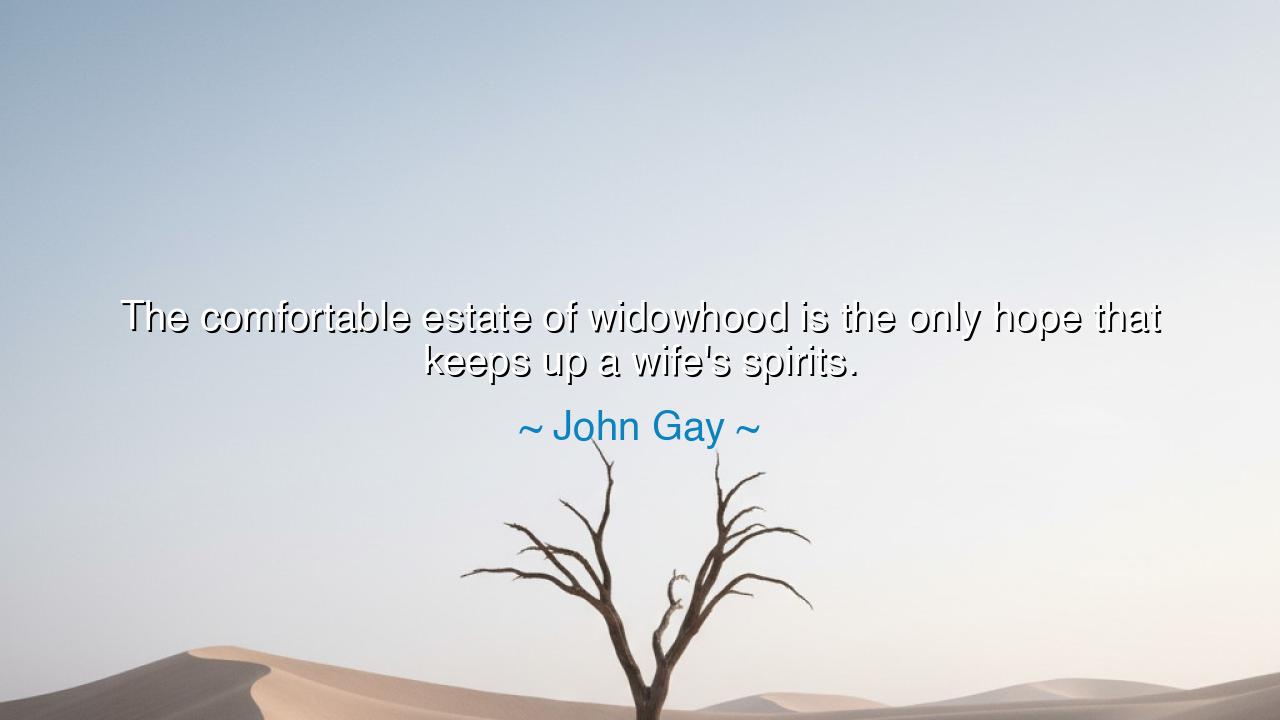
The comfortable estate of widowhood is the only hope that keeps






“The comfortable estate of widowhood is the only hope that keeps up a wife's spirits.” So wrote John Gay, the English poet and playwright of the eighteenth century, known for his biting wit and satirical eye. His words, though wrapped in jest, carry within them a sharp critique of the state of marriage in his time. In them, he paints a picture not of marital bliss, but of a wife so burdened by her husband’s authority and society’s chains that her only imagined comfort lies in his absence—an absence brought about by death itself. This, grim though it may seem, was a mirror held up to a world where women’s freedom was curtailed, their wealth controlled, and their voices stifled.
The meaning of Gay’s words must be seen in the context of an age when a woman’s identity was tied not to her own autonomy but to her husband’s will. Once married, she lost control of her property, her labor, and often her dignity. But as a widow, she gained what was denied her in life with her spouse—independence, freedom to manage her affairs, freedom to speak, to own, and even to refuse another union. Thus the paradox: while marriage bound women, widowhood liberated them. Gay’s sharp tongue revealed a bitter truth—many wives endured marriage with the faint, secret hope that widowhood would finally restore them to themselves.
History itself proves this point. Consider the story of Catherine Parr, the last wife of Henry VIII. While bound to the tyrannical king, she lived in constant danger, her every word measured, her every step shadowed by the fate of Henry’s discarded and executed wives. Yet upon his death, Catherine Parr experienced a brief period of freedom: she published her writings, spoke openly of faith, and even married for love, something denied to her before. For her, as for many women of her time, the “comfortable estate of widowhood” was not sorrow, but a reprieve.
Gay’s words, however, are not meant as simple condemnation of husbands, but as exposure of a system. In an age where women were taught to obey and to submit, where their happiness was often sacrificed to duty, what wonder if they looked to widowhood as a kind of salvation? His irony cuts deep: what kind of institution must marriage be, if its end is imagined as a woman’s true beginning? It was a call, cloaked in satire, to recognize the imbalance and cruelty of such a world.
Yet, let us not take his words as universal law. For there have always been marriages of devotion, where husband and wife were companions rather than master and servant. The letters of John and Abigail Adams reveal a bond of mutual respect and deep affection, where argument and debate existed but so did encouragement and love. In such unions, widowhood brought grief, not relief. Gay’s sharp observation, therefore, must be seen as critique of the many marriages built upon oppression, not of the rare ones built upon equality.
The lesson for us, passed down through centuries, is plain: any union that shackles rather than uplifts, that silences rather than celebrates, breeds despair rather than joy. If women once longed for widowhood as their only hope of freedom, then the call of our own age must be to build marriages where freedom and companionship coexist, where neither partner fears bondage but both rejoice in mutual growth.
Practical wisdom follows: if you are wed, do not let your partner’s spirit dream of freedom in your absence. Instead, strive to be the source of their freedom in your presence. Honor their autonomy, respect their desires, encourage their independence. Let your love not be a chain, but a shelter. If you are not wed, carry this truth: a union is worthy only if it uplifts. Marriage should not be endured in hope of liberation, but cherished as the sharing of two free souls.
Thus John Gay, in his biting satire, delivers to us a truth cloaked in irony. The comfortable estate of widowhood should not be a woman’s only solace; her comfort and joy should be found within the marriage itself. Let us, then, learn from the past, and vow to create unions of dignity, equality, and mutual love—so that the laughter of satire may no longer hide the sorrow of truth.






AAdministratorAdministrator
Welcome, honored guests. Please leave a comment, we will respond soon